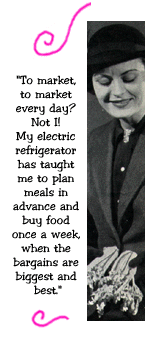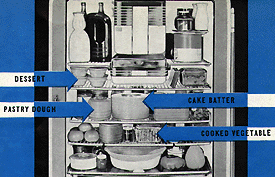 I discovered the following bit of advice in Buffalo, in Grandma Rose’s kitchen ~ a pamphlet discussing the joys and merits of cooking and storing food electrically. The cover was torn off so I don’t have the exact details of publication, but according to Grandma it came with her newly purchased electric Hotpoint stove sometime in the 1940s.
I discovered the following bit of advice in Buffalo, in Grandma Rose’s kitchen ~ a pamphlet discussing the joys and merits of cooking and storing food electrically. The cover was torn off so I don’t have the exact details of publication, but according to Grandma it came with her newly purchased electric Hotpoint stove sometime in the 1940s.
When I asked her if I could have the booklet, she said, “I don’t know why you would want that! Whatever would you do with it?”
1940s: Refrigeration Electrically
![]() The New Technique in Cookery ~ Refrigeration
The New Technique in Cookery ~ Refrigeration
1. Arrange food on shelves to allow free circulation of cold air.
2. Remove wrappings. Wipe milk bottles, trim and wash vegetables, wipe solid fruits, pick over berries, but don’t wash.
3. Cover (in containers or with waxed paper) all foods which have no natural covering. Place meat and other highly perishable foods in coldest part of the refrigerator. Cover meat loosely with waxed paper.
4. To reduce operating cost: Open refrigerator door only when necessary. Cool hot foods to room temperature before putting them into the refrigerator.
5. Clean refrigerator once a week and check over contents to make sure that left-overs are not standing too long.
6. Don’t refrigerate bananas, jelly, pickles, ketchup, unopened cans or other foods which do not require chilling.

Everything that goes into your electric refrigerator has a right place.
It Pays Its Way
You expect ~ and get ~ a lot of special service from your electric refrigerator. It’s always ready to chill fruit and vegetable juices, melon balls and other appetizers ~ really chill them, so they’ll make a bored appetite hopeful for what’s to come. It’s always ready to jell soups and salads and desserts ~ to crisp salad greens ~ to make ice cubes, to tinkle in tall glasses ~ to freeze an astounding variety of ice creams, mousses, sherberts and parfaits.
But your electric refrigerator pays its way in your kitchen by providing a temperature low enough to keep foods safe for many days. It’s this dependable low temperature that enables you to save money by stocking up on bargains ~ to save last minute hurry by preparing foods in advance.![]()
Source: [Hotpoint stove pamphlet, ca. 1940s]
~ pp. 55-57 ~